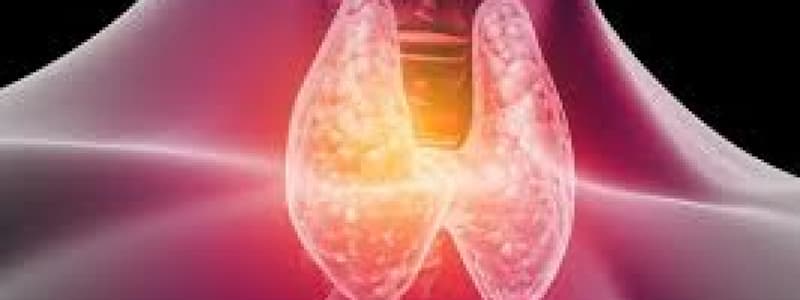Podcast
Questions and Answers
What is the primary purpose of administering methimazole and PTU to patients?
What is the primary purpose of administering methimazole and PTU to patients?
- To promote bone health
- To manage hyperthyroidism (correct)
- To suppress TSH release
- To replace thyroid hormones
Calcium imbalance can occur when initiating or increasing the dose of calcitriol.
Calcium imbalance can occur when initiating or increasing the dose of calcitriol.
True (A)
What is the recommended action if a patient shows signs of iodism?
What is the recommended action if a patient shows signs of iodism?
Discontinue iodine solution immediately.
Levothyroxine is indicated for ________ therapy for patients with hypothyroidism.
Levothyroxine is indicated for ________ therapy for patients with hypothyroidism.
Match the following adverse effects with the corresponding agent:
Match the following adverse effects with the corresponding agent:
What should be closely monitored in children receiving thyroid agents?
What should be closely monitored in children receiving thyroid agents?
Iodine solutions should be given to patients without considering the risk of tooth staining.
Iodine solutions should be given to patients without considering the risk of tooth staining.
Patients allergic to desiccated thyroid products may be prescribed ________ as a synthetic hormone option.
Patients allergic to desiccated thyroid products may be prescribed ________ as a synthetic hormone option.
What is the primary function of the hormone thyroxine (T4)?
What is the primary function of the hormone thyroxine (T4)?
Hypothyroidism can lead to weight loss in patients.
Hypothyroidism can lead to weight loss in patients.
What autoimmune disorder is the most common cause of hypothyroidism?
What autoimmune disorder is the most common cause of hypothyroidism?
The enlargement of the thyroid gland is referred to as a __________.
The enlargement of the thyroid gland is referred to as a __________.
Match the following symptoms with their corresponding effects of hypothyroidism:
Match the following symptoms with their corresponding effects of hypothyroidism:
Which of the following statements about iodine is correct?
Which of the following statements about iodine is correct?
Elevated carotene levels can lead to yellow or orange skin in hypothyroid patients.
Elevated carotene levels can lead to yellow or orange skin in hypothyroid patients.
What is myxedema, and why is it significant?
What is myxedema, and why is it significant?
Primary thyroid disorders show __________ TSH and __________ free T3 & T4 levels.
Primary thyroid disorders show __________ TSH and __________ free T3 & T4 levels.
Which of the following is NOT a common symptom of hypothyroidism?
Which of the following is NOT a common symptom of hypothyroidism?
What is the primary treatment for alleviating symptoms of hypothyroidism?
What is the primary treatment for alleviating symptoms of hypothyroidism?
Exophthalmos is a symptom of hypothyroidism.
Exophthalmos is a symptom of hypothyroidism.
What condition is characterized by severe hypothyroidism that can progress to confusion and coma?
What condition is characterized by severe hypothyroidism that can progress to confusion and coma?
In hyperthyroidism, levels of free T3 and T4 are _____ compared to normal.
In hyperthyroidism, levels of free T3 and T4 are _____ compared to normal.
Match the type of thyroid disorder with its corresponding treatment:
Match the type of thyroid disorder with its corresponding treatment:
Which of the following is a common cause of hyperthyroidism?
Which of the following is a common cause of hyperthyroidism?
Thyroid nodules are always cancerous.
Thyroid nodules are always cancerous.
What type of test can differentiate between 'hot', 'warm', and 'cold' nodules?
What type of test can differentiate between 'hot', 'warm', and 'cold' nodules?
In patients with hyperparathyroidism, levels of calcium in the blood are _____ compared to normal.
In patients with hyperparathyroidism, levels of calcium in the blood are _____ compared to normal.
Match the condition with the appropriate symptom:
Match the condition with the appropriate symptom:
What is a potential complication of untreated hyperthyroid conditions?
What is a potential complication of untreated hyperthyroid conditions?
Graves Disease results from autoimmune stimulation of the thyroid gland.
Graves Disease results from autoimmune stimulation of the thyroid gland.
What type of medication is often prescribed to decrease thyroid hormone synthesis in hyperthyroid patients?
What type of medication is often prescribed to decrease thyroid hormone synthesis in hyperthyroid patients?
PTH (parathyroid hormone) is secreted when blood calcium is _____.
PTH (parathyroid hormone) is secreted when blood calcium is _____.
What is a characteristic symptom of hyperthyroidism?
What is a characteristic symptom of hyperthyroidism?
Flashcards
Pituitary Gland
Pituitary Gland
The "master gland" that controls other endocrine glands.
Hypothalamus
Hypothalamus
A brain region that sends signals to the pituitary gland to regulate hormone production.
Endocrine Assessment
Endocrine Assessment
Evaluating a patient's hormone levels and medical history to diagnose endocrine disorders.
Goiter
Goiter
Signup and view all the flashcards
What causes a goiter?
What causes a goiter?
Signup and view all the flashcards
Hypothyroidism
Hypothyroidism
Signup and view all the flashcards
Hashimoto's Thyroiditis
Hashimoto's Thyroiditis
Signup and view all the flashcards
Hypothyroidism Symptoms
Hypothyroidism Symptoms
Signup and view all the flashcards
Systemic Effects of Hypothyroidism
Systemic Effects of Hypothyroidism
Signup and view all the flashcards
Primary Hypothyroidism Diagnosis
Primary Hypothyroidism Diagnosis
Signup and view all the flashcards
Antithyroid Agent Administration
Antithyroid Agent Administration
Signup and view all the flashcards
Iodine Solution Safety
Iodine Solution Safety
Signup and view all the flashcards
Monitoring Antithyroid Therapy
Monitoring Antithyroid Therapy
Signup and view all the flashcards
Iodism: Watch Out!
Iodism: Watch Out!
Signup and view all the flashcards
Levothyroxine Uses
Levothyroxine Uses
Signup and view all the flashcards
Levothyroxine Dosing in Children
Levothyroxine Dosing in Children
Signup and view all the flashcards
Antithyroid Agents in Children
Antithyroid Agents in Children
Signup and view all the flashcards
Bisphosphonates for Hypercalcemia
Bisphosphonates for Hypercalcemia
Signup and view all the flashcards
Radioactive Iodine Uptake (RAIU) Test
Radioactive Iodine Uptake (RAIU) Test
Signup and view all the flashcards
Study Notes
Thyroid & Parathyroid Disorders: Basic Concepts
- The pituitary gland is the "master gland" controlling other glands.
- The hypothalamus sends messages to the pituitary gland, which then directs other organs like the thyroid and adrenal cortex.
Endocrine Assessment
- Assess current and past medical history, including work location and recent events like accidents.
- Crucial to evaluate blood levels and urinalysis.
Endocrine Treatments
- Hormone replacement therapy is a common treatment.
- Suppressing hormone overproduction is another therapeutic approach.
Thyroid Gland
- Shaped like a butterfly, located in the neck.
- Requires iodine for hormone synthesis; dietary iodine is essential.
- High iodine intake can temporarily reduce thyroid hormone production as a protective mechanism (e.g., potassium iodide).
- The thyroid produces hormones triiodothyronine (T3) and thyroxine (T4).
- Thyroxine (T4) regulates metabolism.
- Thyroid disorders are more prevalent in women compared to men.
Goiter
- Enlargement of the thyroid gland
- May be associated with excess thyroid-stimulating hormone (TSH) or low iodine levels.
Hypothyroidism
-
Low thyroid levels (insufficient T3 and T4).
-
Common causes include Hashimoto's thyroiditis (autoimmune disorder), medications, genetics, postpartum thyroiditis, or congenital conditions.
-
Symptoms: cold intolerance, weight gain, lethargy, fatigue, memory deficits, and poor attention span.
-
Other symptoms include muscle cramps, constipation, decreased fertility, and brittle nails.
-
Important to note that reduced LDL receptors lead to hyperlipidemia and elevated carotene levels can cause yellow/orange skin. Also, decreased renal function can increase susceptibility to drug toxicity due to impaired kidney filtration.
Diagnosis and Treatment
- Primary: High TSH, low free T3 & T4; thyroid is not responding properly to TSH, so hormone replacement therapy (e.g., levothyroxine) is vital.
- Secondary: Low TSH, low free T3 & T4; pituitary issue; treatment focuses on removing any tumor causing the issue.
- Hashimoto's Thyroiditis: levels gradually decline.
Hyperthyroidism
- Elevated free T3 & T4 levels.
- A common cause is Graves' Disease, where antibodies bind to and activate thyroid-stimulating hormone (TSH) receptors, causing the gland to enlarge and overproduce thyroid hormones.
- Other causes include subacute thyroiditis, postpartum thyroiditis, thyroid adenoma (tumors), excessive TSH, toxic multinodular goiter (TMG), or excessive iodine ingestion (Jod Basedow Syndrome).
- Symptoms include nervousness, insomnia, sensitivity to heat, weight loss, enlarged thyroid gland, increased heart rate, anxiety, and tremors. Exophthalmos (protruding eyes) and Graves ophthalmopathy(inflammation of the eye tissues) may also be observed.
Thyroid Medications
- Levothyroxine (Synthroid): replacement therapy for hypothyroidism (low thyroid hormone).
- Propylthiouracil (PTU) and Methimazole (Tapazole): antithyroid agents used to treat hyperthyroidism (high thyroid hormone).
- Radioactive iodine (RAI): used to treat hyperthyroidism by destroying part of the thyroid gland.
Parathyroid Gland and Disorders
- Located within the thyroid gland.
- Secretes parathyroid hormone (PTH), which regulates calcium levels in the blood. Low calcium levels trigger PTH secretion, which activates bone reabsorption and intestinal calcium absorption by the kidneys.
- Hypoparathyroidism: Rare; often due to inadvertent damage during thyroid surgery; symptoms mirror hypocalcemia.
- Hyperparathyroidism: Presence of a parathyroid tumor increases PTH and calcium levels, requiring surgical removal of the tumor to restore calcium balance.
Thyroid Nodules
- Can be symptomatic or asymptomatic.
- Single nodules may warrant further screening for potential cancerous growths.
- Multiple nodules often indicate benign conditions.
- Ultrasound, needle biopsy, and scans (hot, warm, or cold nodules) help identify potential problems.
Thyrotoxic Crisis (Thyroid Storm)
- Severe hyperthyroid condition with exaggerated metabolic effects triggered by stress, infections, surgery, trauma, medication interactions.
- Requires quick treatment to reduce thyroid hormone production, slow heart rate, and support overall body function.
Case Study Notes
- Antithyroid Agents: Administer medications at regular intervals, monitor patient response via blood tests, and watch for adverse effects (e.g., iodism, liver toxicity).
- Calcitriol: Monitor for GI effects (metallic taste, nausea, etc.), CNS effects (weakness, headache), and liver or kidney (renal) effects.
- Levothyroxine: crucial for replacing thyroid hormone for hypothyroidism.
- Children: thyroid and parathyroid considerations include monitoring growth and development, adjusting medication doses according to age, and closely tracking serum calcium levels.
Studying That Suits You
Use AI to generate personalized quizzes and flashcards to suit your learning preferences.




